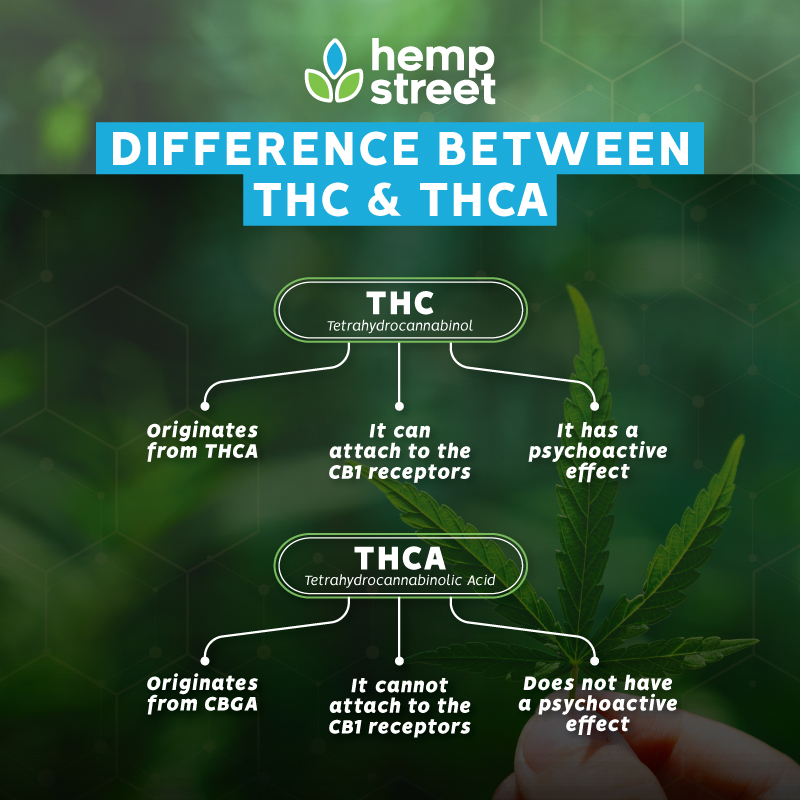Whether or not one is an expert in the field of cannabis, chances are, they know about THC. In general, recreational marijuana consumers prefer products with higher levels of THC. However, THC has certain medicinal benefits which get shrouded due to its psychoactive properties. Despite the THC content in cannabis, if you were to chew fresh cannabis leaves, you wouldn’t experience the psychoactive effects. This is due to a compound found in cannabis called THCA. It is similar to THC, but not quite the same. Through this article, we will understand the differences between THC and THCA.
What is THCA?
Cannabis comprises of a lot of major cannabinoids. All of these cannabinoids originate from cannabigerolic acid (CBGA). When the cannabis plant matures, certain enzymes which are peculiar to the particular cannabis strain, convert the cannabigerolic acid or CBGA into different combinations of the three major cannabinoid precursor compounds, namely, cannabidiolic acid (CBDA), tetrahydrocannabinolic acid (THCA), and cannabichromenic acid (CBCA). Therefore, THCA is one of the cannabinoid precursor compounds of cannabis.
THC vs. THCA
THCA is the precursor compound of THC (tetrahydrocannabinol). In order for THCA to produce THC, the cannabis plant needs to be heated. Heating, or any other force would commence thermal decarboxylation. Thermal decarboxylation refers to the process through which THCA converts into THC, by losing its acidic carbonyl group. This is the reason why THCA does not have psychoactive properties and THC does.
Cannabis produces intoxicating effects when consumed through common methods such as smoking, vaping, baked edibles, etc. because in each case cannabis has been heated enough for the THCA to be converted into THC.
Health benefits of THCA
THCA contains all the medicinal properties of THC, without the intoxicating effects. This is because the compound is too big to be able to attach to the CB1 receptors, unlike THC. As compared to THC, there is limited research on the medicinal properties of THCA. However, there are some studies which suggest that THCA has some therapeutic benefits.
Preliminary studies suggest that THCA has the following:
- Anti-proliferative properties– A study conducted in 2013 on animals showed that THCA has the potential to prevent the spread of prostate cancer cells.
- Anti-inflammatory properties– A 2011 study suggested that THCA exhibited anti-inflammatory properties like other cannabinoids.
- Antiemetic properties– Antiemetic refers to a property which helps increase appetite and decrease nausea. A 2013 study conducted at the University of Guelph concluded that THCA and CBDA were effective in alleviating nausea and vomiting in rat models.
- Neuroprotective properties– A preclinical study conducted in 2012 found that THCA exhibited the ability to protect against neurodegenerative diseases.
Research has also suggested that THCA could be effective for muscle spasms, insomnia, pain, etc. This information is yet to be backed by fool-proof evidence.
How to consume THCA
Since THCA converts into THC fairly quickly when exposed to heat, there is not a huge variety of THCA products in the market. Due to this, methods such as smoking, vaping, etc. prove to be redundant. Therefore, THCA could be consumed through methods such as raw cannabis juicing, and raw cannabis tinctures.
Word from HempStreet
As THCA does not have psychoactive properties, consumers can enjoy its medicinal benefits while avoiding the cannabis high. Therefore, it has minimal side effects. However, a medical professional must be consulted before self-medicating using marijuana for THCA, since it is important that the patients consume the appropriate quantity prescribed for their condition.




